Security Awareness Training Price Guide For 2026

In this guide, we'll cover everything you need to know about security awareness training costs in 2026.
We'll deep-dive into various influencing factors and outline how company size, time commitment, and provider types can impact the price you'll be expected to pay. If you want to cut cybersecurity training costs, this article will equip you with much-needed information.
How Much Does Security Awareness Training Cost?
In 2026, you can expect to pay between USD$0.60 and USD$6 per month per employee for security awareness training. Where exactly you land in this price range depends on the type of provider you choose, the size of your business, and the commitment you make (i.e., a monthly, annual, or multi-year purchase).
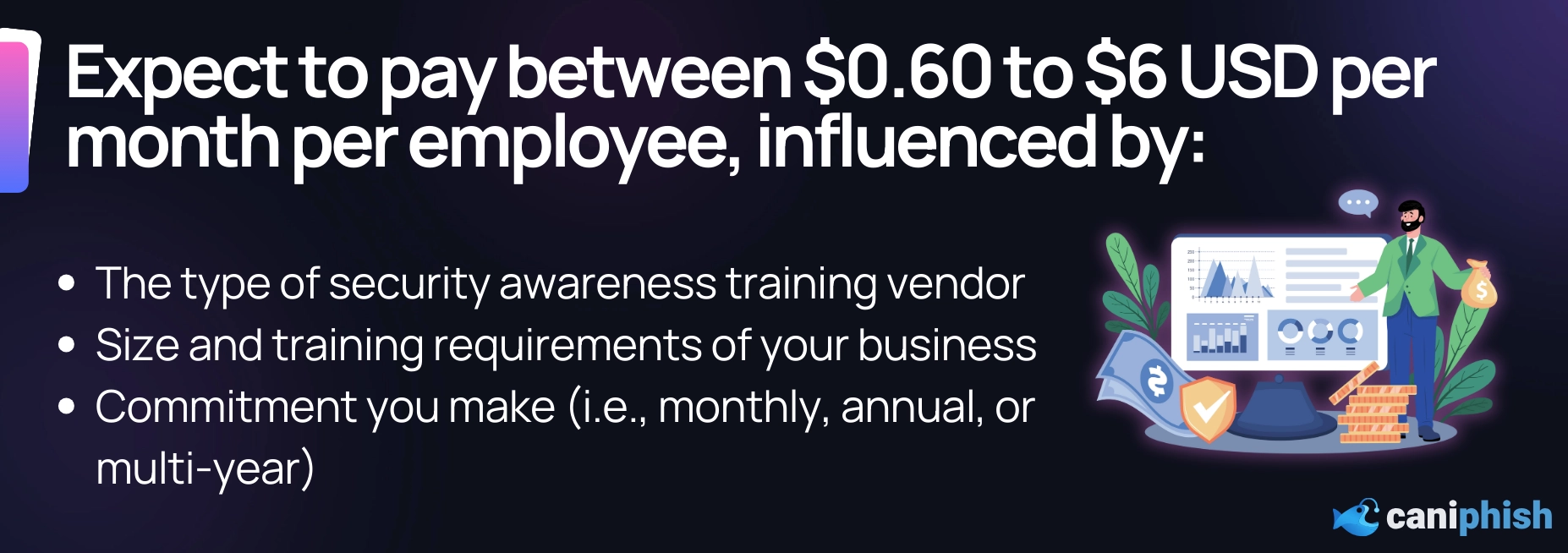
Let's dive into these factors to understand their impact on the cost of running security awareness training.
The Types Of Security Awareness Training Vendors
There are four types of security awareness training vendors. It's important to identify this because the type of vendor you choose has an impact on the price you can expect to pay.
Option 1. Modern Security Awareness Training Vendors
Using a modern vendor is the most cost-efficient way to conduct security awareness training.
Typically, these vendors maintain profitability by following a low-margin, high-volume business model and do this by implementing two practices:

Minimize Acquisition Costs
Vendors do this by using organic marketing in combination with a seamless user experience, such that any friction from the onboarding process is removed. By utilizing these techniques, vendors can avoid using dedicated sales professionals, which allows them to offer their products at a lower price point.

Minimize Support Costs
Vendors do this by providing customers with all the information, tools, and educational content needed to implement and maintain their security awareness training program. This minimizes the need for customers to contact support teams, which means vendors require less support staff.
This approach to cost minimization is typically a win-win for all parties. The vendor can save on operational expenditure, offer a low-cost alternative to legacy and specialist training vendors, and still remain profitable. The downside of this approach is that customers may need to upskill during the onboarding process.
Depending on the size of your business and the commitment you make, you can expect to pay between USD$0.45 and USD$1.25 monthly per employee.
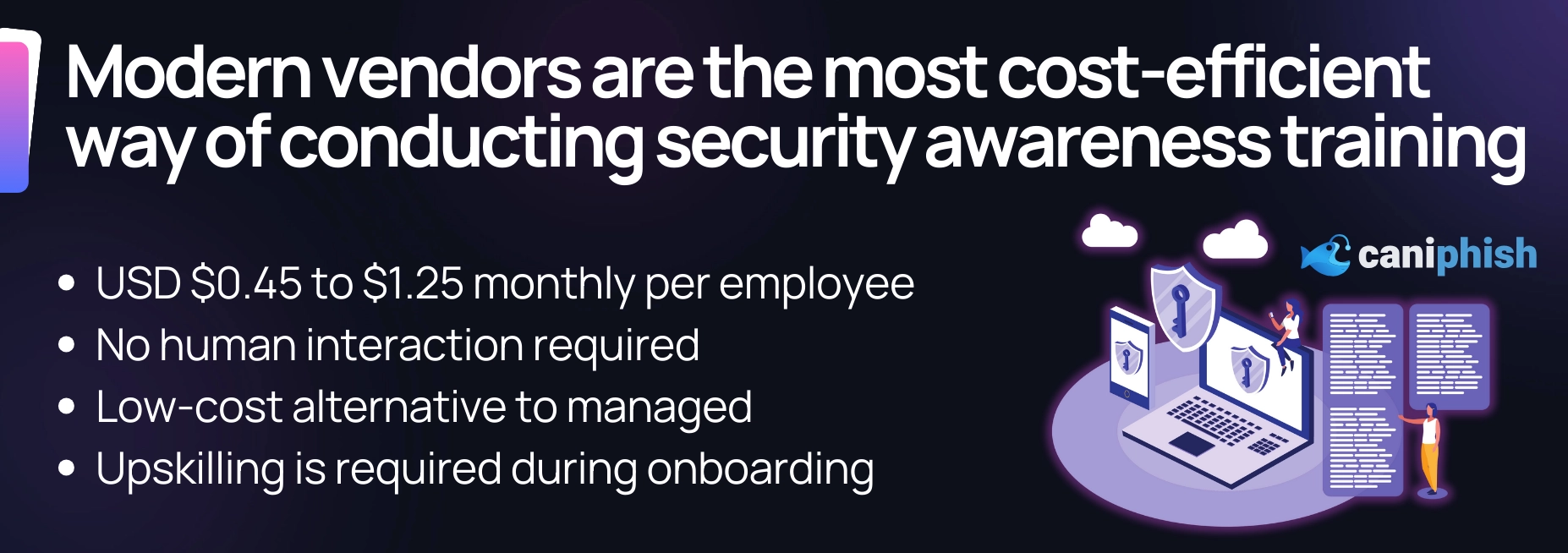
Option 2. Legacy Security Awareness Training Vendors
Legacy security awareness training vendors have been the only option for the past decade. These vendors are typically more rigid in their onboarding process, which comes with benefits and downsides.
The typical onboarding process for the platforms offered by these vendors is to:
- Register interest in an evaluation
- Receive a demonstration of the platform
- Speak with a sales representative for pricing (public pricing may not be available)
- Onboard the platform with assistance from technical support
- Have monthly or quarterly check-ins from customer success
Using these vendors does come at a premium cost, which is the main downside. You will need to make an annual or multi-year commitment and can expect to pay between USD$1.30 and USD$4.00 monthly per employee.
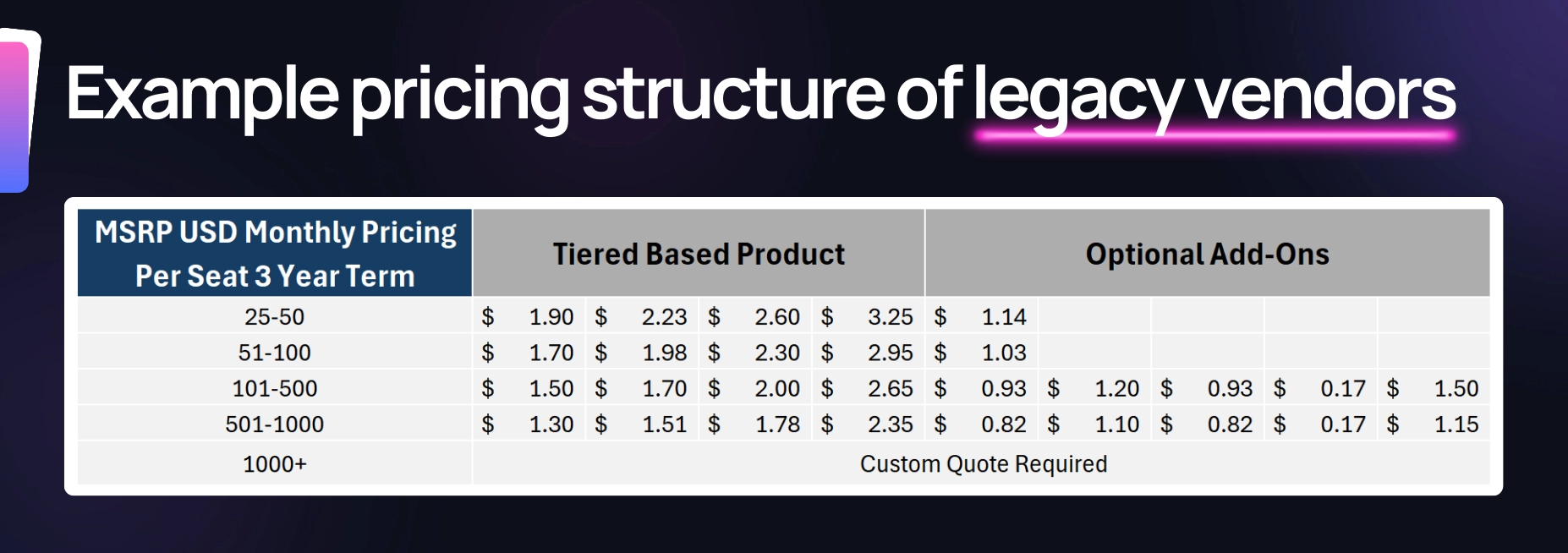
Option 3. Specialist Security Awareness Training Vendors
Specialist training vendors have been and always will be a solid option for conducting security awareness training. These vendors are typically expensive but have some of the most in-depth training capabilities available.
They are typically consultants in your country or region and have hands-on, relevant knowledge of your industry or business requirements. For example, they may thoroughly understand your compliance or privacy obligations or know trending pertinent threats to your business.
They will typically offer a variety of training solutions depending on your business needs. For example, the training may be virtual or in-person, and software platforms may be used to help power their security awareness training offering.
When using a specialist training vendor, expect to pay between USD$3.00 and USD$6.00 monthly per employee.
Option 4. Open-Source Security Awareness Training Tools
Open-source tools are usually much more limited in capability and require significant investment from internal employees to get them off the ground.
These tools are entirely self-managed. You need to operate the infrastructure, onboard the training material, and potentially integrate multiple open-source solutions to offer an end-to-end training capability.
While open-source tools have no immediate cost, you need to factor in the time it takes to onboard and maintain them and whether your business has the necessary expertise to use them effectively for training your employees.
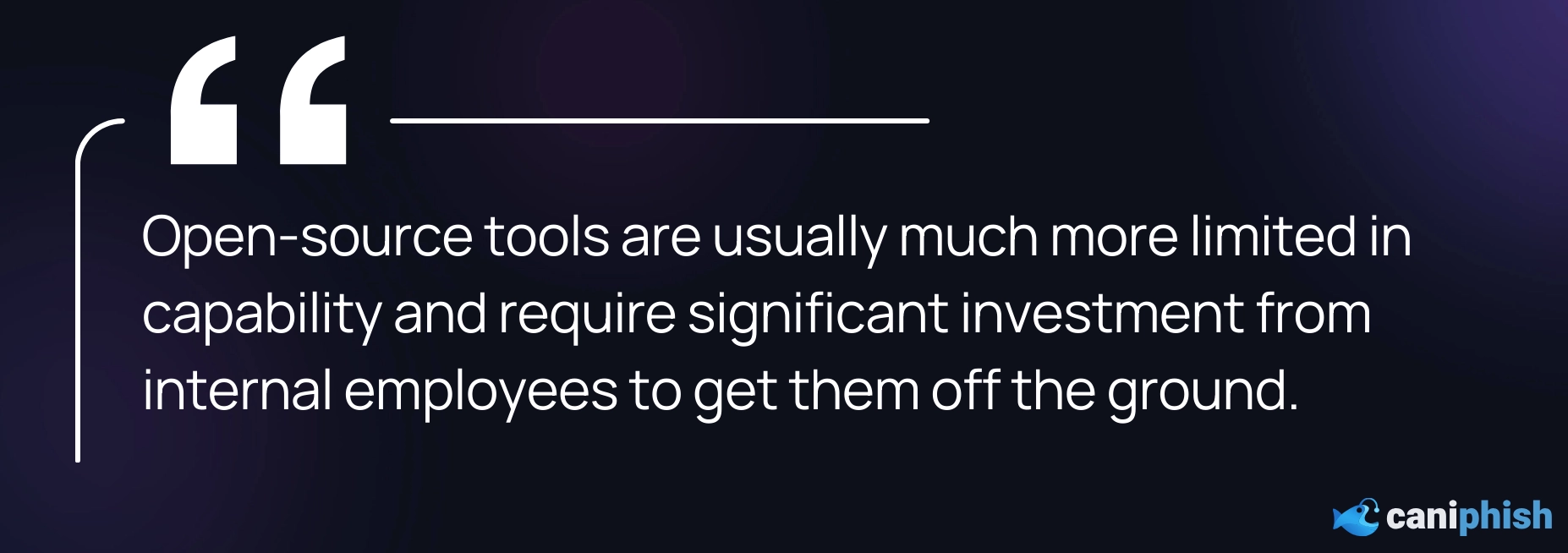
Now that we understand the types of tools, platforms, and providers available, let's understand how the size of your business may impact the cost of security awareness training.
How Does the Size Of Your Business Impact Pricing?
Regardless of the type of provider you're using, there are sunk costs associated with acquiring and setting up the necessary infrastructure for each customer. As a result, you'll typically find that the cost per employee associated with running security awareness training becomes progressively lower as you scale through certain employee thresholds.
Each provider has different thresholds, but to give you an example, at CanIPhish, we provide the following discounting based on the size of a business:
- 40% discount for businesses with 100 or more employees
- 50% discount for businesses with 500 or more employees
- 60% discount for businesses with 1,000 or more employees
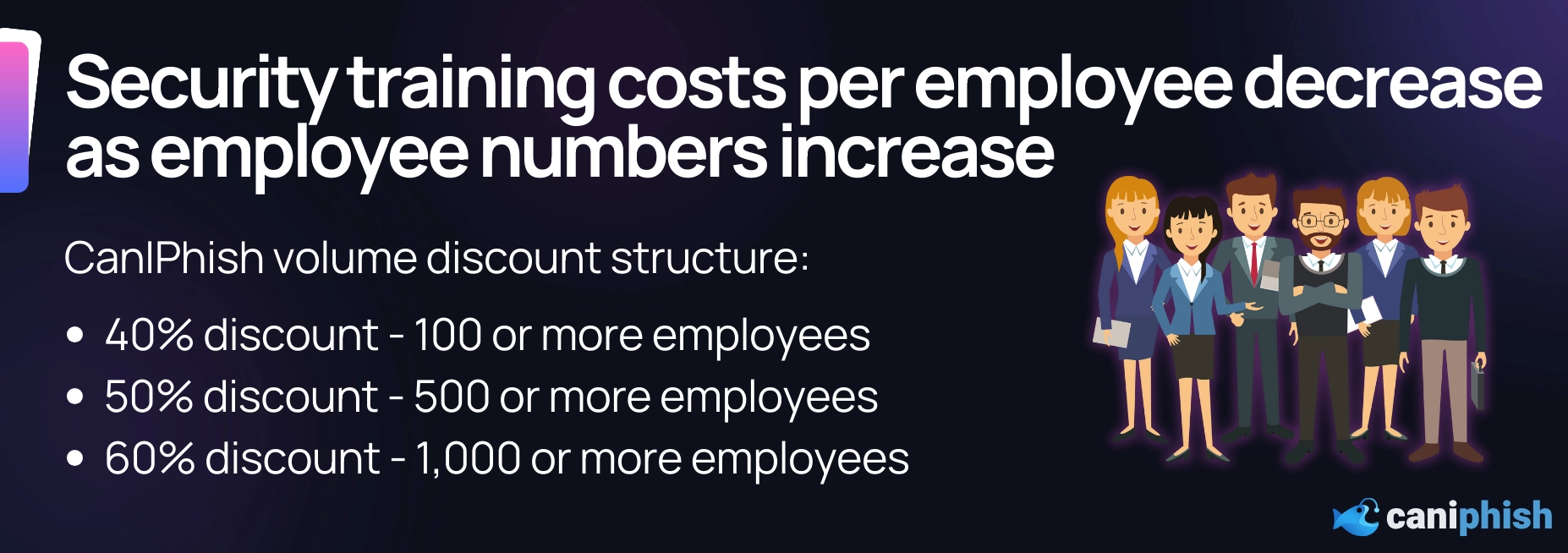
Next, let's understand how your commitment impacts the price per employee.
How Does The Commitment You Make Impact Pricing?
As mentioned, providers have upfront acquisition and support costs when onboarding customers. Because of this, almost every security awareness training provider will force customers to make an annual or multi-year subscription-based commitment. Based on market research, you can expect the following discounts depending on the commitment you make:
-
Monthly subscription: Typically, no additional discounting is applied, and very few providers offer subscriptions that only have a monthly commitment.
-
Annual subscription: If a provider offers monthly subscriptions, you can typically expect a 20-40% discount for annual subscriptions. For example, CanIPhish provides a 40% discount on monthly pricing for annual commitments. If monthly subscriptions aren't on offer, then no additional discounts will apply.
-
Multi-year subscription: Typically, multi-year subscriptions are stacked based on the years you commit. The discounts can be 5-10% for every year of commitment. For example, with a 3-year commitment, you could expect an additional 15% discount from what the annual subscription purchase would be.
Example Pricing Scenarios
Now that we understand all the factors that determine how security awareness training is priced, let's look through a couple of real-world pricing scenarios.
#1 Pricing Example - Train 1,500 Employees Every Month
In this scenario, training is conducted every month, and accordingly, an annual subscription is required:
Modern Training Vendor Pricing
USD$1.25 base price x 60% volumetric discount = USD$0.48 a month per employee.
Annualized cost: USD$8,640
#2 Pricing Example - Train 250 Employees Once A Year
In this scenario, training is conducted once a year, and accordingly, a monthly subscription is preferred:
Modern Training Provider Pricing
USD$2.00 base price x 40% volumetric discount = USD$1.20 monthly per employee.
Annualized cost: USD$300 (Monthly available)
Note: These examples are for demonstration purposes only. Every provider offers different pricing based on industry, geographic location, or currency used for the transaction.
Conclusion
It can be difficult to select the provider that suits your organization best. We recommend considering the following criteria before deciding on your preferred provider:
- Do you have staff who speak multiple languages? Ensure the provider you choose can support multi-lingual training. The translation process should be seamless and auto-translate based on browser settings or allow for manual configuration.
- Ensure your provider meets your compliance and privacy needs. There are hundreds of providers and platforms out there. While it's tedious, read through their terms and conditions or privacy policy to understand how they handle your data, where it's located, and whether it will be shared with third parties such as insurance brokers.
- Evaluate before you purchase. It can be difficult to understand the benefits and capabilities a provider can offer you without evaluating their solution. Ensure that any providers you're considering offer a free evaluation, ideally without time pressures.
- Use simulated phishing to help direct training activities. Simulated phishing attacks are a fantastic tool to help direct training to those most in need. Many security awareness training providers offer phishing as part of their package. Ensure that the phishing capabilities provided are realistic and in-depth. Every phishing attack should entice employees to perform a secondary action, such as downloading an attachment, clicking a link, or simply responding to the message.
- Use automation to reduce operational overheads. The idea of manually setting up security awareness training campaigns every month is enough to deter people from the activity itself. Many platforms offer automation capabilities that can cycle through various training materials every week, month, or quarter to reduce the need for you to do it manually.
- Look at the vendor's roadmap and traction. The security awareness space is flooded with legacy vendors who have no product roadmap or budget to innovate. It’s important to understand what the vendor has on their roadmap to understand if they can keep up with your evolving security awareness requirements.
Free Security Awareness Program Generator
Is your organization taking the right steps to avoid a cybersecurity breach? Create your free tailored program today.
Generate your programFrequently Asked Questions
How Do I Justify Paying For Security Awareness Training?
Justifying the expense of security awareness training should be approached by emphasizing the cost-effectiveness of proactive cyber security protections.
To do this, you can either look at the average cost and frequency of a cyber breach or perform a quantitative risk analysis specific to your own company. You can then look to see what it’ll cost to implement a security awareness training program and whether the risk reduction it provides outweighs the potential cost of a cyber breach.
A Security Professional who loves all things related to Cloud and Email Security.
